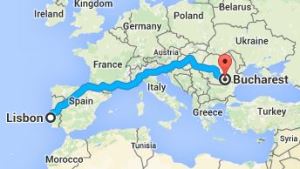
Manaus, in the heart of the Amazon, will have a big football stadium to go alongside its most famous curiosity, it grand old opera house.
Last night an Australian commentator reporting on the World Cup soccer match between Australia and Jordan (the former won 4-0) said: “The World Cup in Mexico was really good but the one in Brazil next year should be even better”, and his colleagues wholeheartedly agreed with him, although I don’t think any of them were young enough to remember the last World Cup held in Mexico in 1986. They certainly weren’t old enough to be drinking tequilas! But there is this idea that the tournament in Brazil next year is going to be one great party, and why not? Brazilians are renowned for their joie de vivre, to use a French term (which would be translated into Portuguese as alegria de viver, alegria meaning happiness).
Of course, whenever a nation hosts a big international sporting event, there are grumbles about the costs involved, and Brazil has had to endure a lot of negative press about the quality of its infrastructure, corruption at football and political levels, its relatively high levels of violence, whether it will actually be ready for the games, etc etc etc etc. There is about one year to go before the competition starts, and here is a typically sober article (“Brazil’s unease is growing“) in The Guardian newspaper outlining the above-mentioned issues. Sure, I can understand that big, spanking brand new stadiums in far-flung cities such as Manaus and Cuiabá and even the capital itself, Brasilia, are bound to be “white elephants” (Portuguese doesn’t have an exact equivalent expression) because there are no local football teams with a fan base strong enough to support them. But I have seen the previously dilapidated (in Portuguese decadente, deteriorado, velho) stadiums in Sao Paulo, Rio de Janeiro, Belo Horizonte and Salvador, among others, and think that people in the big cities of such a football-mad nation deserve some modern, comfortable facilities, even if the stadiums go to neglect over the next 20 years. Brazil’s football grounds are being dragged into the 21st century. Anyway, it’s going to be a party, and who cares about money and misery, right? That’s what parties are for, to escape these things.

Bound for Brazil … Japanese football fans (Photo credit: StewieD)
There have been a good many World Cup qualifying matches in most parts of the world in the past week or so, but we are still a long way from knowing which teams will be there next year. Brazil, as the host nation, will be involved, of course, but at this stage the only other team that is officially, definitely, mathematically guaranteed of a spot is Japan. Travel agencies and language schools around the world must be on edge, hoping that their nation makes it so that they can take advantage. And the various travel guide book publishers, too, must be awaiting the outcome, so they know which language versions of their Brazil guides they should publish more of, although the fact that Rio de Janeiro is hosting the 2016 Olympics means their books are a pretty safe bet regardless.

This is all the infrastructure you need for a good time in Brazil. Futuro Beach, Fortaleza. (Photo credit: Wikipedia)
We will get a glimpse of the football infrastructure in Brazil for the rest of this month when the country hosts the 2013 Confederations Cup. Brazil, Japan, Mexico and Italy will contest Group A, while Spain, Uruguay, Nigeria and Tahiti play in Group B. It is not often you get to see Tahiti on the world stage. Go Tahiti! The matches will be played in Belo Horizonte, Recife, Fortaleza, Rio de Janeiro, Salvador and Brasilia from June 15-30. The final, of course, will be in the famous Estádio do Maracanã (put the stress on the accented vowels) in Rio de Janeiro on June 30. Wish I could be there. The party is just about to begin.

Is this striped skunk drunk or sober? (Photo credit: Marie Hale)
A party in Portuguese is uma festa, to throw a party is dar uma festa, and to get the party warmed up is animar a festa. Festas can also mean caresses and fondling (I suppose the one thing leads to another). Uma festa só para homens is a stag party and uma festa só para mulheres is a hen party (literally, party only for men/women). Furar uma festa is to gatecrash a party (furar means to bore, pierce, puncture, penetrate, break open etc). Food is comida, drinks are bebidas. What else do you need? Music is música, to dance is dançar, to sing is cantar. To be drunk is bêbedo, to be blind drunk is completamente bêbedo and to be drunk as a skunk is bêbedo como um gambá. Sober is sóbrio. A hangover in Brazilian Portuguese is uma ressaca, estar com ressaca or ressacar-se is to be suffering a hangover. But ressaca normally means the surf, undertow, flux and reflux, breakers, or a small bay formed by the flux of the tide. It can also mean disgust and displeasure. To say cheers, to your health! is à sua saúde! or saúde! for short.






